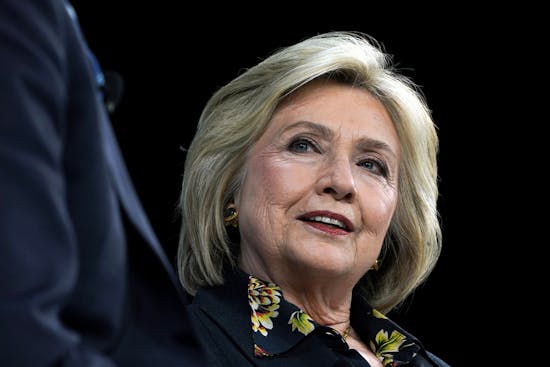The title is "Rodham," as in Hillary Rodham (Clinton), but the most vivid character is Trump, as in you-know-who.
Curtis Sittenfeld's speculative novel works as a companion to the Minneapolis writer's splendid "American Wife," which eavesdropped on a fictional first lady very much like Laura Bush. This time, Sittenfeld uses (mostly) real names but doesn't seem to have as much affection for her subject as she did for Bush.
Posing as an autobiography, "Rodham" implies that the protagonist's key mistake was that for too long she defined herself by the men she knew. In "Rodham," at least, Hillary's life story literally begins when she meets Bill Clinton, launching a passionate relationship described in terms sure to skeeve out many readers. As Bill lauds Hillary's "delicious honeypot" or brings her to ecstasy while driving, some readers may flash back to that time they accidentally walked in on Mom and Dad doing it. Sorry, Chelsea.
Also, sorry, Chelsea, because you were never born. The conceit of "Rodham" is that Hillary's life takes a different direction when, having learned early on that Bill can't keep it in his pants, she opts not to marry him. Or have children.
Late in the novel, Hillary wonders what it's like to be a man, to be able to have both a presidential run and a family, but concludes those things don't mix for people with honeypots. (The book is being compared to Philip Roth's alternative history "The Plot Against America," in which Charles Lindbergh was elected president, but Sittenfeld is more interested in an alternative life for Hillary than in how that would affect our country.)
Eventually, she has a change of heart, but one difficulty is that the book's point of view — Hillary's point of view — is a puzzle. She's writing in the present, when we know for sure that the real Hillary has a sense of humor, but she depicts herself as a self-serious prude, only growing a sense of irony when she reaches 60.
Sittenfeld captures both the charisma that made Bill Clinton a national figure and the snake-oil salesman odor that still clings to him. The novelist really hits her stride when Hillary runs for president, under different circumstances than she did in real life. Trump pops up as a blowhard financier whom Hillary sucks up to while privately likening him to an elementary school classmate who claimed that, if he concentrated, he could knock over a pillar at Chicago's Museum of Science and Industry with his pinkie.
Sittenfeld's depiction of Trump is pitch-perfect, giving this witty writer an opportunity for her humor to come through. Sittenfeld also is wise about the nuances of doing work that is always visible/criticizable. ("Anyone with any public identity and a modicum of savvy knows, of course, that you don't read the comments, except when you do.")
In Sittenfeld's take, Hillary is an expert judge of character but her fussy voice sometimes rings false, as when she feels the need to tell us who Oprah Winfrey is (her "Chicago based talk show had become a nationally-syndicated ratings juggernaut"). Maybe the real message of the novel is that the complicated Rodham is impossible to pin down?
It feels exactly right to identify Bill's marriage proposal as a turning point, but I'd be curious for Sittenfeld to explore, as she did in "American Wife," how that marriage might have worked. Yes, it's unfair to ask a novelist to write a different book, but surely the most confounding mystery about Hillary is not "What might have happened if she left?" but "Why did she stay?"
Chris Hewitt is a Star Tribune critic. • 612-673-4367
Rodham
By: Curtis Sittenfeld.
Publisher: Random House, 432 pages, $28.






